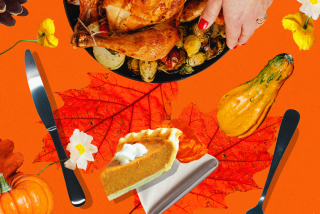A holiday meal goes through a lot
- Share via
Food takes center stage at Thanksgiving like no other holiday -- with a mighty appetite the sole ticket for admission. It matters little whether the main course is turkey or Tofurky. What counts is the presence of family, friends and neighbors at an event that dates back almost 400 years in this country and evokes baronial and even biblical festivities with its celebration of bounty -- and even excess.
Read on for an understanding of how the traditions and myths that guide our annual eating extravaganza are passed from one generation to the next. And how -- like the family silver and china -- some are just a little tarnished and chipped.
It’s not your imagination if it sometimes seems as if your stomach has a mind of its own. More than a century ago, British physiologists discovered the “second brain” -- that is, a nervous system in the gut. In the last decade, research has shown that this enteric nervous system can -- and does -- operate independently of the brain, which helps to explain irritable bowel disease and other disorders of the gastrointestinal tract.
As for the stomach itself, think of it as a washing machine that can churn and stretch as needed to accommodate bigger loads -- a fact that is both a blessing and a curse.
The empty adult stomach is wrapped in smooth muscle tissue and is roughly the size of a clenched fist. Expanding to about the size of a water balloon, it can hold about 33 ounces -- about a liter -- of food and drink. Keep eating beyond that, and many people will feel uncomfortably stuffed.
Dieting can cut stomach capacity by about 30% in a month, according to Allan Geliebter, senior research scientist at the New York Obesity Research Center at St. Luke’s Hospital, Columbia University. So when people say, “My stomach has shrunk, I can’t eat as much,” there’s some truth to that, although studies suggest the effect lasts only as long as calories are restricted.
Similarly, chronic overeating trains the stomach to distend. So, on average, obese people can accommodate slightly more than a liter before feeling full -- a fact that helps them sustain their girth. The stomachs of obese binge eaters can comfortably hold even more, but the most expandable stomachs belong to an unlikely group: those at a healthy weight with bulimia nervosa. This dangerous eating disorder of bingeing and purging enables the stomach to stretch to hold up to two liters -- not a feat recommended for anyone.
Rest assured, however, the stomach-stretching that typically occurs with the Thanksgiving feast is “not permanent, it’s a temporary adjustment,” Geliebter says. Whether you will feel hungrier for a few days afterward -- or want to skip eating for a while -- varies from person to person.
On Thanksgiving, few people need to work up an appetite. So be wary of the cocktails before the meal. A 1999 Dutch study found that serving a few ounces of wine or beer before lunch increased the number of calories eaten compared with sipping the same amount of water, grape juice or fruit juice laced with either protein or a little fat. An aperitif also encouraged faster eating, increased meal time slightly and delayed feeling full.
In the stomach, food is bathed in hydrochloric acid and churned to break it into smaller particles for delivery into the small intestine, where it is further digested and absorbed. Eating causes levels of the appetite hormone ghrelin to fall, which sends satiety signals to the brain. As food moves into the small intestine, more hormones are produced to cut appetite, slow stomach-emptying and signal other organs, including the gallbladder, to release bile to emulsify fat.
As the food moves from the small to the large intestine, gas and bloating can be caused by the normal breakdown of undigested foods by bacteria, particularly in the colon. Average production of gas ranges from one to four pints per day, according to the National Digestive Diseases Information Clearinghouse.
All told, digestion of the rich foods and wines of the Thanksgiving feast places a heavy load on the gastrointestinal tract. But resist the temptation to lie down or nap after eating. Tryptophan, an essential amino acid found in turkey, has been blamed for stimulating serotonin production in the brain and the tendency to snooze, but there’s little scientific evidence to back that up.
Besides, lying down after a meal can increase heartburn, indigestion and the symptoms of gastroesophageal reflux disease by placing added pressure on the junction between the stomach and the esophagus.
Intensive exercise isn’t a good idea either. Blood flow is increased to the intestinal tract after eating. Vigorous physical activity shifts that blood to the muscles, which in turn slows transit time of food through the gastrointestinal tract.
The best bet, Geliebter says, is to take a leisurely walk. It keeps blood flowing without putting a lot of pressure on any bodily system. Plus, it may make room for you enjoy a slice of pumpkin pie.
More to Read
Eat your way across L.A.
Get our weekly Tasting Notes newsletter for reviews, news and more.
You may occasionally receive promotional content from the Los Angeles Times.










